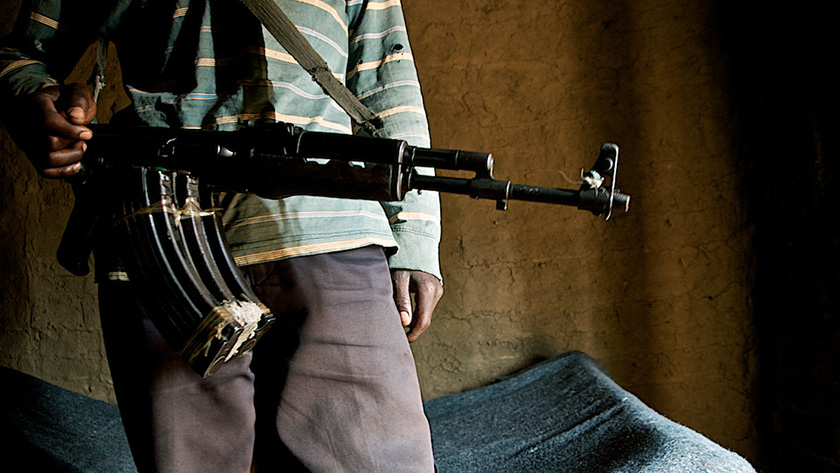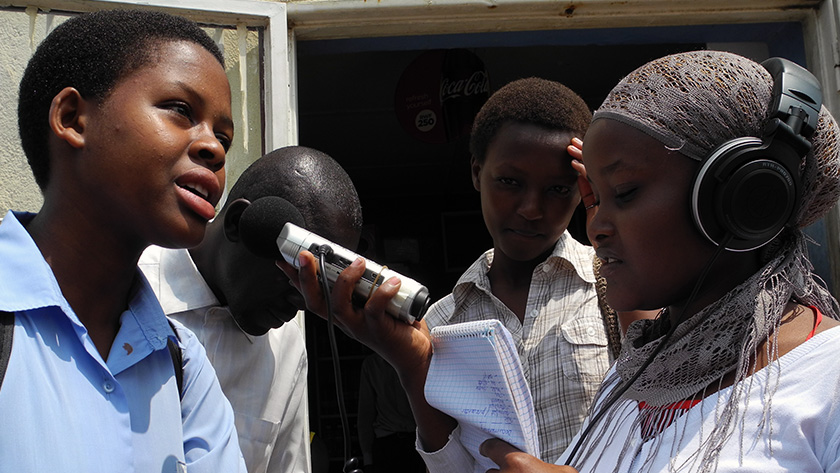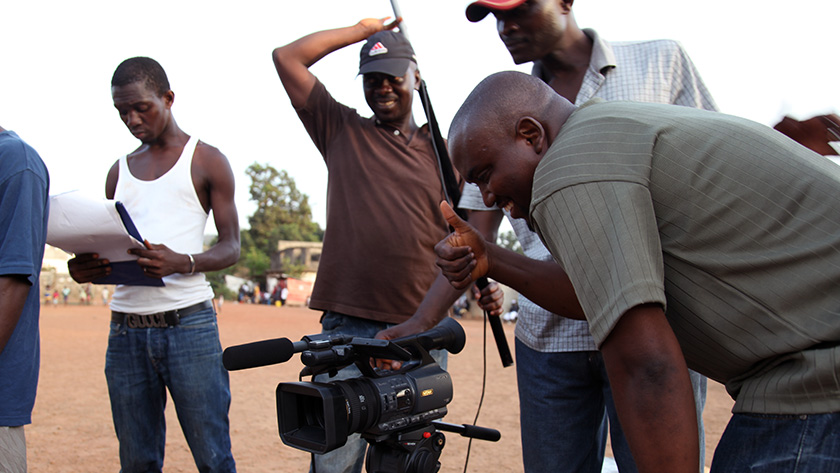In 1993, political tension in Burundi ignited and quickly engulfed the country in violent conflict. Long-simmering tensions born of colonial divisions quickly ignited into bloody massacre. Hutus and Tutsis who had lived as neighbors turned on each other. Children were armed and sent into battle. Hundreds of thousands died within the first few months of a civil war that would continue for over twenty years.
In that landscape of atrocities and inhumanity in the mid-90s, two journalists reached across the divide and came together to found the first multi-ethnic radio production company in the region. Search for Common Ground’s Studio Ijambo was groundbreaking—some called the journalists ethnic traitors and hurled death threats. At a time when the radio waves were rife with hatred, Studio Ijambo rose above the conflict to become the only reliable news source, broadcasting stories for all of Burundi’s communities. One of their most popular shows told the stories of Burundians who had risked their lives by reaching across ethnic divisions to protect their neighbors—this while the violence continued to rage. The top US diplomat in the Africa at the time of the outbreak of the Burundian civil war credited Search’s Studio Ijambo with helping to prevent genocide.
Conflict is inevitable, violence is not. That’s the basic premise of Search for Common Ground (Search), the leading global peacebuilding organization founded by John Marks and Susan Collin Marks in the early 80s. They believed that ordinary citizens are the most effective peacebuilders. Search works at all levels of society to build sustainable peace through three main avenues: dialogue, media, and community. Search dismantles the inclination for violent conflict and reduces the overall cost of violence, including the need for humanitarian aid. From an economic standpoint, violent conflict costs far more than stability—the global economic cost of violence was $14.3 trillion in 2016.

“Violent conflict is now the primary cause of poverty and suffering in the world today,” said Shamil Idriss, CEO of Search for Common Ground. “It’s vitally important that you have governments engage, but they must be complimented by citizen peacebuilders. They are the only ones who can operate effectively right now to deal with the most devastating kinds of conflict that are escaping the influence of the intergovernmental agencies.”
The first step Search takes within any new country or region is to build multiple partnerships with governments, civil society organizations, the business sector, and international organizations. They facilitate dialogue at both the local and national levels through formal mediation, youth leadership training, and back-channel diplomacy. Search uses media for large-scale engagement around the root causes of violence and to overcome the differences that can feed conflict. On a community level, Search builds safe spaces for grassroots conflict resolution: soccer matches, participatory theater, and shared farming projects. “Our teams on the ground apply what I can only describe as sort of a mad scientist approach to peacebuilding,” said Idriss. “They try anything within a ‘do no harm’ framework.”
Though their programs and initiatives are many and varied, the Search approach has several key components. Search makes long-term commitments to communities—it often takes a full generation to build the solutions that address root causes of violent conflict and to build peace. Search builds and supports local teams and broad-based partnerships that reach across the dividing lines that underlie a society’s conflict. Search works to build local capacity and multi-stakeholder partnerships so that any community can successfully manage its own conflicts. Its experimental approach is quick to adapt to participant needs. Search aims for sustainable cooperation and collaboration, not just dialogue or compromise, and they specifically target partnerships and relationships that can catalyze systemic change.

“We work from a perspective of hope,” said Idriss. “There’s too much of a trauma surgeons’ triage approach to diagnosing conflict settings. You really have to start with what’s going right.” Search is now the largest peacebuilding organization in the world with some 60 offices and nearly 700 staff, and thousands more partners and volunteers. “Peacebuilding” though is not a word found in most English dictionaries. They’ve launched an awareness campaign to rectify that, and earlier this year Search was nominated for a Nobel Peace Prize.
The list of Search accomplishments is long and spans the globe. In 2015, after five years of focused advocacy, Search for Common Ground and its partners helped push through UN Security Council Resolution 2250 on Youth, Peace, and Security, which shapes international norms about youth engagement in peace processes and stipulates that all governments prioritize their inclusion and empowerment in peacebuilding and violence prevention. Last year in Nigeria a state governor held a meeting of security forces, herders, and farmers who had been locked in conflict. He thanked the Nigerian Search staff for stabilizing the region. John Kerry and Mohammad Zarif, Iran’s Minister of Foreign Affairs, both publicly acknowledged the breakthrough role that Search played in the Iran nuclear deal.

Conflict has evolved during the lifespan of Search—the most critical conflicts spill over nation state borders and threated to destabilize entire regions. With its plan for the next decade, Search will move past its country-based model towards understanding conflict systems with shifting, porous boundaries. Search will launch programs in new geographies including: the Northern Triangle of Central America, the Arabian Peninsula, and the Horn of Africa.
Humankind is interdependent, and change is always possible. Just ask the journalists of Brurundi’s Studio Ijambo. “These adversarial sorts of win-lose approaches, where one side’s right, the other side’s wrong, in today’s world these are increasingly leading to lose-lose outcomes,” said Idriss. “We no longer have to make the case that conflict is a critical problem. We’re getting requests for support from people that we used to have to beg to take us seriously. Governments and corporations have come smack up against the reality that they simply can’t handle modern dynamics of conflict. The challenge to our field is can we demonstrate that there is a better way and that it actually works.”